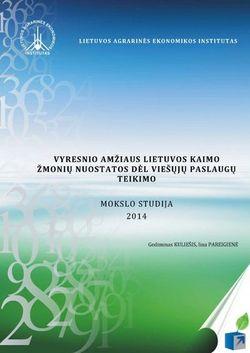
In Lithuania, as in many countries around the world, observed the phenomenon of demographic aging. Concerns about demographic aging pose a debate not only in scientific but also in political discourse. The international community has begun to draw more attention to the demographic aging challenges and search for measures to mitigate them. The share of 65 years and older population in rural areas is bigger than in cities. To ensure the older population dignified, healthy, active aging is important to ensure their access to main public services, which supply in rural areas is more complicated, compare with the cities. Scientists, politicians raises the question - is it good to grow old in rural areas? For public sector organizations that seek to optimize the delivery of public services is important to know the level of customer satisfaction, to assess it in order to make appropriate decisions on further action.
The aim of research - to assess attitudes of elderly rural residents toward public services delivery and their opinion on opportunities to volunteer by themselves.
The study identifies main tendencies of demographic aging in rural areas, overviews the challenges of aging. Discuss the supply of public services in rural areas aspects and obstacles. The alternatives for traditional public service delivery strategies were overviewed. A structures opinion survey about elderly rural resident’s attitudes toward public services delivery was performed. 5 spheres of public services were researched: transport, social services, family doctor accessibility, cultural activity, feeling of safety. Respondents were also asked about volunteering experience. According to the results of survey elder rural resident are not satisfied about transport service delivery, the most difficulties were experienced by living alone, living in remote areas and having worse health state. The biggest part of respondents was satisfied about providing of social service, family doctor accessibility and cultural activity. Half of the respondents pointed they feel safe, living in rural areas. Half of the respondent took part in volunteer activity: cultural sphere, working bee, management of environment.
Quantitative and qualitative scientific research methods were used in this work: analysis of the scientific literature, documents, secondary statistical data analysis was performed, comparative methods, logical comparison were used. Elderly rural resident’s attitudes of toward public services delivery were evaluated using questionnaires.
Keywords: aging, older people, rural, public services, volunteering.
Kuliešis, G.; Pareigienė, L. 2014. Vyresnio amžiaus Lietuvos kaimo žmonių nuostatos dėl viešųjų paslaugų teikimo: Mokslo studija. Vilnius: Lietuvos agrarinės ekonomikos institutas. 56 p.: iliustr., santr. angl. (online) ISBN 978-9955-481-49-2.
